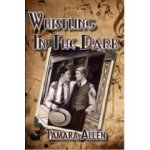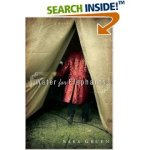 Whistling in the Dark
Whistling in the Dark
Tamara Allen
Publisher: Lethe Press
ISBN-10 1590210492
ISBN-13 978-1590210499
see publisher’s website for buy links lethepressbooks.com
Available in print & electronic
I’m a sucker for any book about music and musicians, and a sucker for a well-written book about gay men, and a sucker for anything in the era 1890-1930. And Whistling in the Dark gave me all three. Tamara Allen made a convincing New York on the cusp of Prohibition, and has created characters the reader comes to know and care about.
Jack Bailey is cynical, unapologetically homosexual, smart-assed, a little bit flamboyant at times, quick-tempered, prone to drinking and gambling and borrowing money from questionable sources. And beneath the bluster and the Attitude, he has been wounded psychologically by double tragedies: service in France in WWI and the influenza death of his beloved parents before he returns home. If the term Post Traumatic Stress Disorder had been invented then, it would certainly apply to Jack. Jack isn’t a musician, except in a ham-handed sort of way, but he believes with his whole heart in the future of technology, in his case in the magic of wire and tubes called radio. He is determined to keep his parents’ business going, a mom-and-pop store of oddities and imports, (including a live crocodile named Woodrow) but has no head for business. What he has a head for is getting into trouble with the law, loan sharks, and potential bootleggers.
Sutton Albright is also a young veteran damaged by life. He had it all: good looks, wealth, adoring and indulgent parents and he grew up in the Midwest, far from the corruption of the Big City. A gifted concert pianist with a brilliant future, a war injury took away. He lights in New York, rootless, futureless, unable to go home. On first returning home he enrolled in a university only to become involved with a male teacher and finding himself expelled. He has no way of explaining that to his parents, no way of explaining that he is a “pervert.” (The word “gay” has not, at this time, gained common usage in that context.
Sutton is mistakenly caught up in a police sweep of a public park and jailed over night. There he first meets Jack. Friendship eventually becomes more, and that, plus Jack’s devotion to developing radio and Suttons’ hesitant resumption of playing the piano, combine to make this a compelling story. Rather than go further with a plot synopsis (I’m awful at them), let me just tell that you will enjoy this book if you enjoy stories of “opposites attracted” to each other. Here are two damaged young men who find each other, sometimes irritated and a little quarrelsome, sometimes tender and loving. Eventually comes the time when Jack has to face an unhappy choice that could lead to a new life for Sutton.
The supporting characters are very well done, individualistic without being overpowering, and most of them are Jack’s friends, eventually becoming Sutton’s friends as well. I especially liked Ox, who was big, and shy, and often mistaken for being slow. I felt there might be just the tiniest bit of stereotyping in some of Jack’s gay club friends; they reminded me a little of the “bitchy queens” in the film “The Boys In the Band.” But the characters in Whistling in the Dark aren’t as annoying.
It’s an outstanding debut novel and I’m sure Allen has many more just waiting to be written. Highly recommended.



